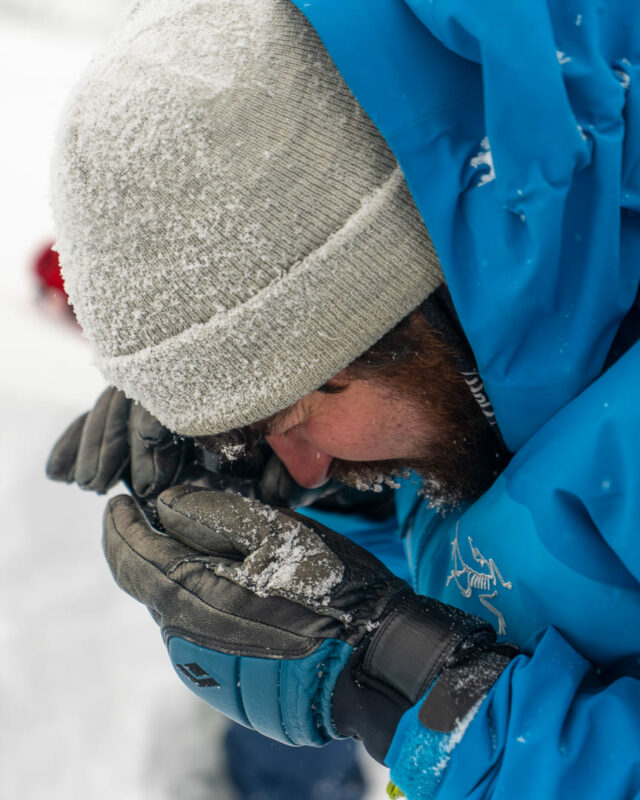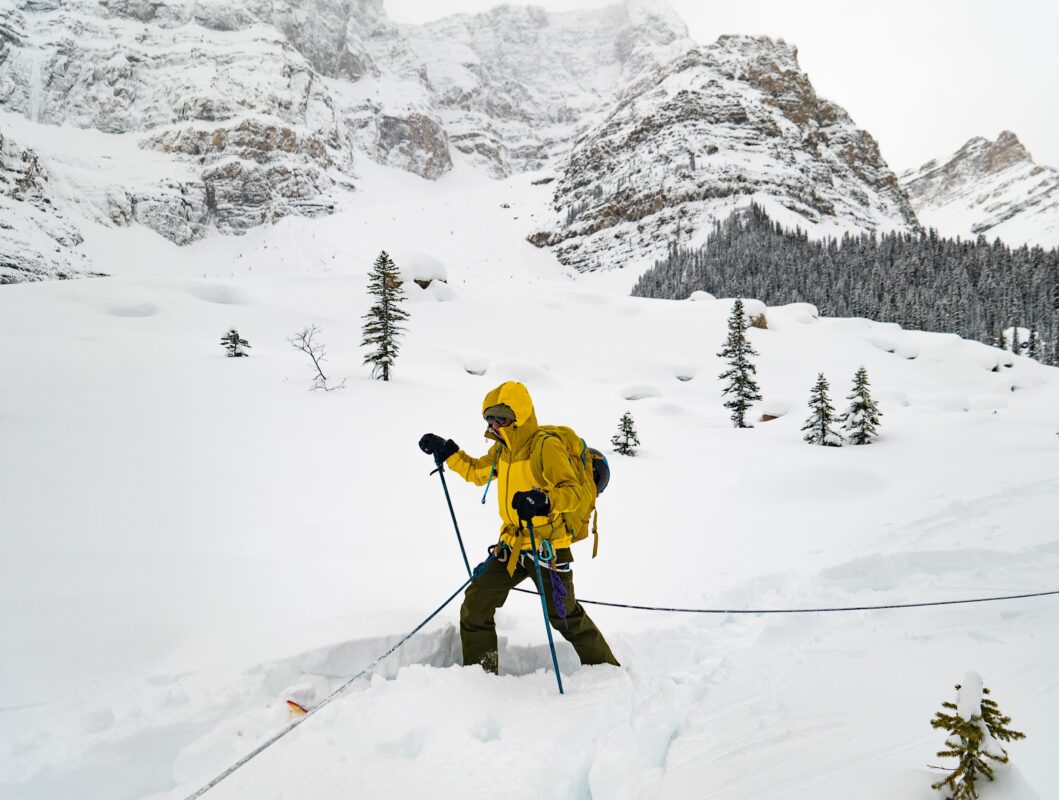-
Learn the essential mountain knowledge for safely excelling in winter ski touring and splitboarding by joining a 6-day winter skills course in Lake Louise and Rogers Pass. Your mentors are very experienced, professional Mountain Guides who will go over glacier travel, avalanche skills training, and intro to ski or splitboard mountaineering in detail. Use your days to the max by getting up early in the morning, going over theory, and then putting it into practice. The risk of being in the backcountry is never zero, but these skills will allow you to mitigate the risks, enjoy the wilderness responsibly, and have a secure outdoor experience.
-
Meet your guide and your team at 8 am at the Lake Louise Alpine Center. This morning will be focused on the intro glacier travel component and technical equipment introduction. In the afternoon, you will practice rope skills. Wrap up the day with a debrief and an in-depth look at an online avalanche forecasting tool to prepare for the upcoming days.
-
Gather at 6:30 am and take advantage of the wonderful Lake Louise area! Apart from some ski touring, you’ll be going through complex companion rescue practice (multiple burials and site leader practice), focus terrain use, gathering snowpack data, up-tracking, downhill lines, and group management. At the end of day three, travel to Golden BC to begin the Rogers Pass component of the trip. Settle at your accommodation at Dreamcatcher hostel or some other local accommodation.
-
Once again, meet your team at 6:30 am. Today you’ll be ski touring in the Rogers Pass zone and glacier travel will be top of the list of objectives. Go over terrain use, up-tracking, gathering snowpack data, downhill lines, and group management. Wrap up your days with a debrief and a team meeting for the upcoming days.
-
-
Glacier travel
- Rope management for glacier travel
- Understanding the ice dynamics & how to avoid crevasses
- Snow and ice anchors
- Load transfer
- Crevasse rescue techniques, 2:1, 3:1 hauling advantage
- Rappelling
- Self rescue
Avalanche Skills Training—leave with AVCAN AST 2 Certification
- Terrain management
- Ongoing risk perception discussions
- Steep skiing theory
- Group management
- Snowpack analysis
Intro to Ski Mountaineering
- Trip Planning
- Equipment
- Mountain Weather and Navigation
- Ski Techniques in Steep Terrain
- Ski Mountaineering Ascent
- Participants leads
-
-
-
What you get on this adventure:
-
- Experienced, certified guides with extensive knowledge of the area
- 6-day winter skills training in the Banff area (Lake Louise and Rogers Pass)
- Pre-course package with learning tools
- Pre-course logistics and planning
- Group equipment
What’s not included:
-
- Technical backcountry ski touring equipment
- Transportation to Lake Louise
- Food and snacks
- Accommodations
- Guide gratuities — optional
-
-
To make the most of this winter skills course in Banff, you should have a good level of endurance, good fitness for skiing or snowboarding, and AVCAN AST1 Certification (or equivalent experience). This winter skills course offers 6 days of training and has been carefully designed to develop your existing skills, as well as to teach you new techniques crucial for exploring the mountains safely and independently.
-
To participate in this tour, you need to have previous backcountry skiing experience. This winter skills course stretches over 6 days and there are three main portions of the course: glacier travel, avalanche skills training, and intro to ski/splitboard mountaineering.
If you’ve never backcountry skied before, we suggest joining a guide for a day of backcountry skiing in Duffey Lake.
-
For technical backcountry ski touring gear, you will need to bring:
-
- Alpine touring skis, telemark skis or splitboard with skins (can be rented)
- Touring boots and poles (can be rented)
- Avalanche safety equipment (can be rented with your guides):
- Digital, 3-antenna avalanche transceiver or beacon
- Lightweight snow shovel
- Avalanche probe
- Harness, axe, and accessories — can be rented with your guides
- 1x60cm-120cm sewn sling w/ 2 non locking carabiners
- 2x5m 6 or 7mm prusik cord w/ non locking carabiners
- 1×1.5m 6 or 7mm prusik cord (personal prusik)
- 4x locking carabiners (2 lighter-weight carabiners and 2 self-locking carabiners which are larger in size, they can be used for a munter hitch and master carabiner)
- Any new mechanical device, i.e., micro traction from Petzl
For personal items, we recommend bringing:
-
- 40L daypack
- Food
- Helmet — optional
- Sunglasses & Goggles
- Sun and lip cream
- Camera — optional, but recommended
- 1L of water or Tea
- First aid kit
- Food you can eat on-the-go
- Thermos with a warm beverage — optional
- Repair kit and Leatherman for your equipment (can be shared between several people)
This is a list of clothing we recommend you bring:
-
- Gloves or mitts
- Woor and/or synthetic socks
- Mid-insulation fleece or puffy jacket
- Wind and waterproof shell jacket with hood (Gore-Tex recommended)
- Warm outer puffy jacket
- Ski pants (Gore-Tex recommended)
- Down jacket or vest
- Synthetic or wool base layers, underwear and socks
- Extra warm clothing
- Face mask
- Toque — wool or synthetic
- Hat and sunhat
- Sunhat
- Face warmer — scarf, neck tube, face mask, buff, etc.
- Light gloves & insulated gloves or mitts
-
-
During the course of these 6 days, you will have hands-on mentorship from professional Mountain Guides, which is the most effective way to build a strong foundation. Skills will be explained, demonstrated in the field, and then put into practice during field days. There will be team meetings twice daily—in the afternoon, you will discuss the conditions and objectives for the next day including debriefing the current day’s tour, while in the morning the team will analyze the day ahead and avalanche conditions to make the appropriate terrain choices.
You’ll have the chance to put your skills into practice with technical leads including companion rescue and rope rescue leads, ski ascent and descent leads, and overall group management. The objectives will be determined by the overall group skill level and current conditions.
You will also receive a pre-course package containing many details to get you ready for the course.
To find out more about what you’ll cover, scroll down below the FAQ.
-
All mandatory gear can be rented if you don’t have your own. You can rent an avalanche safety pack (including beacon, shovel and probe) from your guides in the booking process.
If you’d like to rent alpine touring or telemark skis (or splitboard), touring boots and poles, you can rent it with the Lake Louise Ski Resort, Fairmont Chateau Lake Louise Rental Shop or Wilson’s Winter Rentals.
Ski rental locations are in the Lake Louise and Banff area and should be picked up the night prior to your outing. If you need to rent gear, let us know and we can help make arrangements.
-
Group sizes and prices:
- For this winter skills course in the Banff area, the usual client-to-guide ratio is 6:1.
- The cost is per person and doesn’t decrease as the group grows.
Winter skills course in the Banff area can be arranged for larger groups. Contact us to make arrangements.
Min. age requirements:
- If you are older than 18, you’re good to go.
- Minors may be permitted to join private tours on a case-by-case basis.
If your group has skiers under the age of 18, contact us prior to booking to make arrangements.
-
To get to Lake Louise, the starting point of your tour, most people fly into Calgary International Airport (YYC). From there, you can take a 2-hour drive, either by renting a car or by a shuttle. You’ll meet your guides and your group on Day 1 of the tour at Lake Louise Alpine Centre.
-
57hours is committed to providing safe outdoor adventure experiences. We require all guides using our platform to have a COVID-19 safety plan and to make the details of that plan accessible to travelers. In most cases, group sizes will be reduced, guides will avoid overcrowded locations, and other safety measures will be met depending on the location and activity.
We also expect clients to respect local regulations and take measures to protect themselves, their guides, and the communities they’re traveling to. For more information on COVID-19 measures in Canada, please refer to Canada’s COVID-19 travel advice.
Please contact us if you have any questions or require further information. We are happy to provide you with the most up-to-date information!
-




